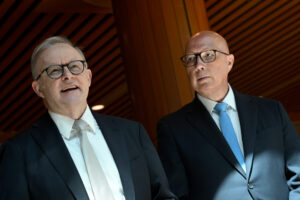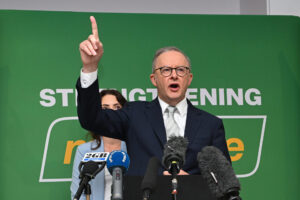Tax and the meaningless law of averages
Based on the way they talk about the proposed income tax cuts, the average Turnbull government MP struggles with the definition of average. To be fair, averages can be a bit confusing.
For example, the average Australian has less than two legs (as the number of people with one leg far exceeds the number of people with three). And this year, on average Australia’s 150 lower house MPs will receive $1000 from Channel Seven to talk about their private lives on television (thanks to the well-publicised decision of Barnaby Joyce).
The fact that, on average, wages are forecast to grow at 3 per cent is irrelevant for all of those workers whose wages aren’t growing at all. Similarly, the fact that strong wage growth in the finance sector in capital cities drags up the average wage across the country is irrelevant to small businesses in regions experiencing no real wage growth.
The fact that the average full-time wage is $82,000 per year is precisely irrelevant to both the economic and political debate about the Turnbull government’s proposed tax cuts.
As any government MP claiming expertise in economic management should know, averages are a poor descriptor of a population when the data is “skewed” by significant outliers. Just as one of our 150 lower house MPs getting paid $150,000 to do an interview “skews” the average amount of cash paid for comment to our politicians, when those earning more than $1 million per year are receiving double-digit pay rises it has a big impact on the average rate of wage increases, but no impact on the standard of living for someone stuck on a flat, or falling, real wage.
What is so important about full-time work? There are plenty of company directors earning hundreds of thousands of dollars for part-time work, and there are plenty of people working full-time for $40,000 per year. The boosters for Mr Turnbull’s top-end tax cuts like to talk about the fact that the average full-time income is $82,000 per year, but the average income for those in paid work is only $62,000.
Given that the ABS estimates that 741,000 Australians are underemployed and want more work than they currently have, it seems odd to tell those who wish they could earn more money that it’s important to give tax cuts to those lucky enough to have both full-time work and good pay.
And what could be more irrelevant in a debate about today’s tax rates than forecasts of what the average income might be in six years’ time. Leaving aside the meaningless of averages when it comes to income, and leaving aside the appalling track record of those predicting wage growth in Australia, the idea that we should legislate tax cuts now because we will all be rich in the future is the political equivalent of promising free beer.
Which brings me to the politics. The latest round of byelections are likely to be the final nail in Malcolm Turnbull’s corporate tax cuts and his proposed top-end personal tax cuts. While Pauline Hanson’s One Nation was clearly willing to deliver a windfall to the big banks, the big retailers and the big petrol station owners well out from an election, it seems she is entirely unwilling to enter a nine week byelection campaign supporting big tax cuts for the companies that are so unpopular among her voter base.
If there is one thing any successful politician can do it is count. And while government MPs might be willing to talk about the average income in Australia, political strategists in all parties know full well that the vast majority of voting-age adults earn far less than $100,000 per year.
While company directors might think six figures is a fair wage for a part-time gig, and the former deputy PM might think it’s fair pay for a day’s worth of embarrassing interview, Bill Shorten, Pauline Hanson and the rest of the crossbench know that the vast majority of voters earn far less than what Mr Turnbull says is “average”.
While the fate of Mr Turnbull’s company tax cuts and top-end personal tax cuts are in the hands of the Senate right now, early next year the Senate will be in the hands of the voters. As the opening salvo in the long campaign for the byelections has already shown, politicians who want to get elected don’t get conned by dodgy claims about averages. They simply count the number of winners and losers. It won’t be long before Coalition MPs start doing the same thing.
This article was published in the Australian Financial Review on 28.05.2018. Richard Denniss is Chief Economist at The Australia Institute.
Between the Lines Newsletter
The biggest stories and the best analysis from the team at the Australia Institute, delivered to your inbox every fortnight.
You might also like
5 ways and 63 billion reasons to improve Australia’s tax system
With a federal election just around the corner, new analysis from The Australia Institute reveals 63 billion reasons why our next Parliament should improve the nation’s tax system.
Business groups want the government to overhaul the tax system? Excellent – we have some ideas.
The landslide win by the ALP has seen business groups come out demanding the government listen to their demands despite having provided them no support, and plenty of opposition, over the past 3 years.
10 reasons why Australia does not need company tax cuts
1/ Giving business billions of dollars in tax cuts means starving schools, hospitals and other services. Giving business billions of dollars in tax cuts means billions of dollars less for services like schools and hospitals. If Australia cut company tax from 30% to 25% this would give business about $20 billion in its first year,


